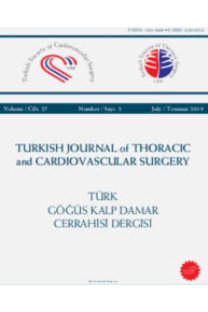Thromboembolic occlusion of upper extremity arteries
Thromboembolic occlusion of upper extremity arteries
___
- 1. Yao JS. Upper extremity occlusive disease. In: Greenfield LJ, editor. Essentials of surgery: scientific principles and practice. Philadelphia: Lippincott-Raven; 1997. p. 594-600.
- 2. Hernandez-Richter T, Angele MK, Helmberger T, Jauch KW, Lauterjung L, Schildberg FW. Acute ischemia of the upper extremity: long-term results following thrombembolectomy with the Fogarty catheter. Langenbecks Arch Surg 2001; 386:261-6.
- 3. Bahçivan M, Demirağ MK, Keçeligil HT, Saraç A, Karamustafa H, Yücel SM, ve ark. İatrojenik damar yaralanmaları. Göztepe Tıp Dergisi 2005;20:38-41.
- 4. Erentuğ V, Mansuroğlu D, Bozbuğa NU, Erdoğan HB, Elevli MG, Bal E ve ark. Akut arteriyel tıkanıklarda cerrahi tedavi. Türk Göğüs Kalp Damar Cer Derg 2003;11:236-9.
- 5. Eskandari M, Yao JST, Pearce WH. Upper extremity occlu sive disease. Available from: http://www.emedicine.com/ med/topic2776.htm.
- 6. Yavuz Ş, Vural H, Eriş C, Türk T, Özdemir A. Periferik arteriyel embolilerinde kardiyak risk faktörleri ve tedavi yaklaşımı. Damar Cer Derg 1998;1:13-7.
- 7. Taviloğlu K, Günay K, Asoğlu O, Dilege Ş, Kurtoğlu M. 10 yıllık periferik arteriyel tıkanıklık olgularımızın analizi. Damar Cer Derg 1995;4:17-21.
- 8. Khalil IM, Hoballah JJ. Late upper extremity embolic com plications of occluded axillofemoral grafts. Ann Vasc Surg 1991;5:375-80.
- 9. Bandyk DF, Thiele BL, Radke HM. Upper-extremity emboli secondary to axillofemoral graft thrombosis. Arch Surg 1981;116:393-5.
- 10. Saraç A, Akan H, Demirağ MK, Keçeligil HT, Bahçıvan M, Kolbakır F. Akut atardamar tıkanıklıklarında lokal trombo litik tedavi. OMÜ Tıp Dergisi 2004;21:78-83.
- 11. Fogarty TJ, Cranley JJ, Krause RJ, Strasser ES, Hafner CD. A method for extraction of arterial emboli and thrombi. Surg Gynecol Obstet 1963;116:241-4.
- ISSN: 1301-5680
- Yayın Aralığı: 4
- Başlangıç: 1991
- Yayıncı: Bayçınar Tıbbi Yayıncılık
Right ventricle restriction following total correction of tetralogy of fallot
Murat SARGIN, Uğur FİLİZCAN, E. Ergin EREN, Erol KURÇ, Serap Aykut AKA, Nurşin Kaynarca KÜLCÜ, Bülent KETENCİ, Gökçen ORHAN
Short-term clinical and hemodynamic results of the sorin soprano and sorin more bioprosthesis valves
İsmet DİNDAR, Noyan Temuçin OĞUŞ, Murat BAŞARAN, Ruken Bengi BAKAL, Eylül KAFALI, Özer SELİMOĞLU, Hamiyet ÖZCAN
Sait AŞLAMACI, Atilla SEZGİN, Salih ÖZÇOBANOĞLU, Kürşat TOKEL, Bülent BOLAT, Can VURAN, Süleyman ÖZKAN, Tankut AKAY, Bülent SARITAŞ
Akciğerin doğuştan hastalıklarında tanı ve cerrahi: 8 yıllık deneyimimiz
Ahmet Ferudun IŞIK, Erkan AKAR, Levent ELBEYLİ, Bülent TUNÇÖZGÜR, Maruf ŞANLI, Fatih METEROĞLU
Left ventricular perforation during cardiac catheterization: a case report
Şenol YAVUZ, Ahmet Hakan VURAL, Tamer TÜRK, Hakan ÖZKAN, Yusuf ATA
Pediatrik ameliyat sonrası kardiyak yoğun bakımda trakeostomi endikasyonları ve sonuçları
Batuhan ÖZAY, Yavuz ENÇ, Umut AYOGLU, Nurgül YURTSEVEN, Yeşim BİÇER, Sertaç ÇİÇEK, Alper GÖRÜR, Fırat ALTIN, Numan AYDEMİR, Gökcen ORHAN
Akciğer kanseri evrelemesinde mediastinoskopinin rolü
Mehmet YILDIRIM, Oya İMAMOĞLU, Murat YAŞAROĞLU, Bülent AYDEMİR, Hatice Coşğun DEMİRBAĞ, Gökhan GÜNEREN, Hakan İLTER, Ilgaz DOĞUSOY
Timus dokusu üzerinde gelişen mediastinal lenfadenit tüberkülozu olgusu
İsmail Cüneyt KURUL, Ali ÇELİK, Cemil Deniz YORGANCILAR, Sedat DEMİRCAN
Right atrial angiosarcoma mimicking a myxoma: from a wrong diagnosis to a difficult decision
Flavia COCCONCELLİ, Flippo BENASSİ, Matteo SCAPİNELLİ, ROBERTO PARRAVİCİNİ
